DAUGHTERS
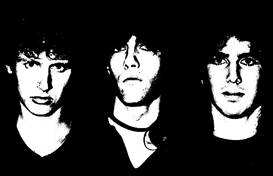
An interview with Simon Ritt
by Scott Bass
(August 2014)
The Daughters may have been a short-lived footnote to the early-'80's Boston underground music scene, but they experienced more than their fair share of memories during their brief existence. PSF field reporter Scott Bass spoke with Daughters' sometimes drummer, sometimes bassist, sometimes guitarist, sometimes singer Simon Ritt about the band's exciting history and their recent unexpected reunion.
PSF: What are your earliest memories of the Boston scene?
SR: Well, I grew up and first started playing in central Florida and there was no original music scene. They had the occasional garage concert, 2 or three times a year maybe. I looked outside of Orlando where this show would come to, Orlando or St. Petersburg or a city like that, so I moved up here in 1980 when I was in my early 20s- the summer of 1980, and that is when I moved to Boston. And so I didn't really grow up in the coolest music scene but still in the early 1980's it was a cool music scene in Boston. You had legendary clubs like the Rat that were having live local, sometimes national bands live 7 nights a week, three bands at night, so 21 different bands a week just at one club.
PSF: So you moved to Boston in 1980 and you were around 21 at the time. And so 1980 is a year before The Daughters EP came out. How long was it before you joined the group?
SR: As soon as I got here, I hooked up with The Daughters. They had already played a few gigs under that name. Their guitar player was my good friend Joe Mazzari and he liked me. He had also grown up in Central Florida and moved to the Boston area, maybe a year or so before I did.
PSF: So you knew each other in Florida?
SR: Yeah, we were actually pretty good friends in our high school years. We shared similar tastes and we lived in a pretty small town so just about anyone who played some kind of instrument would know anyone else. We had our terrible teenage bands but there was no place to take it, there was just no scene of any kind. People weren't playing the kind of stuff we were into. We both especially liked The Dolls or The Heartbreakers, we liked all those British Invasion bands. I remember that first Ramones album blowing me away, it was just so simple and stripped down, and I was probably 17 or 18 or something when that came out. I know a million people who have said that but if a band like the Ramones can start a group and make records anyone can, you know.
PSF: So in '76, you were 16 or 17 and in Florida. What kind of bands were you and Joe playing in there, were they rock bands?
SR: Probably more than anything we emphasized on... it might sound strange but it was a mixture of blues... we both loved English loves, I am a big Rory Gallagher fan and I know Joe is too. I think Rory Gallagher is just about one of the best and unfortunately most overlooked Caucasian electric blues guitar players I have ever watched. He was a great singer, wrote great songs, and we like the heavy bands like Led Zeppelin and Savoy Brown and all that stuff, but we really both loved the Dolls and out of the Dolls we both loved Johnny Thunders, you know. Like I said, we were tight, I remember I was listening to "Chatterbox" for the first time on the tape deck in my car and we were blown away hearing Johnny Thunders sing for the first time. I mean, the reaction was like "With all due respect, the other guy, why didn't he sing all of the songs?
PSF: So you moved to Boston and Joe already had The Daughters going. How long were you in the band before you recorded the EP?
SR: A lot happened in a short amount of time as far as the lineup of it and things like that but we recorded that Varulven EP sometime, about a year later- I can't tell you a date but I remember getting the test pressing for it and being very excited about our first 45 and everything, and we got the test pressing in the summer of '81 because I remember telling Jerry Nolan about it at what would have been our second of third gig opening for Johnny Thunders at a show in Cambridge. It was just one of those scenes you remember, like "Hey Jerry, we got a test pressing today" and he was like, "Good for you kid." Probably summer or early fall of 1981 it would have been released.
PSF: What's the story on how you ended up on the Varulven label, how you met Joe Viglione?
SR: Yeah, Joe we love him very much, he has been very supportive of local bands. There's a lot of interesting stuff on the Varulven label. How we met him, it would probably have been our manager Jim Nestor, and Jim was managing The Daughters and he probably would have been maybe our first contact with Joe. I didn't know most of the records he had done but I was excited that because he had put out a 45 by Willie Loco Alexander, a great Boston artist who goes back to the '60's and briefly played with the Velvet Underground.
He has been on the major labels a few times and I think he is one of my particular favorites. I was a fan of his before I moved to Boston. I love those first couple of Willie Alexander and the Boom-Boom Band records he did for MCA back in the late '70's. He wasn't a big seller or anything but I was fortunate to be turned on to these records. So Willie did a single for Varulven. Willie released a lot of records over the years and I am not sure but I think it was a song called "Gin," a really great song, and even though realistically Willie is a well-respected cult figure, to me, he was a very important, a very significant artist and I was just thrilled to be on Varulven records... That that gave us some validity, "Hey! We are on the same label as Willie Loco."
PSF: The reason I picked up the Daughters EP years ago is because I saw that it was on the same label as Unnatural Axe, did you ever play with them?
SR: I don't think we ever did but I am very fond of Richie Parsons. I've seen Unnatural Axe many times over the years and I don't know him well, but the main guy Richie is just one of the nicest guys in town and he still plays and he has been doing some new recording just on the side. You should really check them out.
PSF: What groups do you recall playing with on the same bill with The Daughters back then?
SR: Well, anybody in Boston who was around in the 1980's. There was a band from the North shore of Boston called The Dawgs, they were the kind of band that was popular with all of the musicians. Their lead singer and songwriter was a guy named Phil Haynen, and this guy Phil had the classic rock and roll gravelly voice. It is like, you know Rod Stewart and the guy in AC/DC. Guys would kill for a voice like this...
PSF: So what other local acts do you recall playing with?
SR: Yeah, like we played with Mission of Burma, we played with the Neighborhoods a couple of times, we played with the Human Sexual Response a couple of times and of course, we opened for the Replacements when they were nothing, at a show at the Rat. We opened for the Go-Gos before they had an album out, which was a great time. If you ask me what it was like, it was not exactly a very democratic time, but it was great..., even if we never became as big as the Go-Go's and Replacements, it was great to be playing the same stage, the same night, the same gig with so much talent. Great guys like Asa Brebner who was in the Modern Lovers and also Robin Lane and the Chartbusters. There was a great band, another Boston favorite band called the Dogmatics.
PSF: How did The Daughters meet Johnny Thunders?
SR: Well, Joe and I grew up loving a lot of the same stuff. We loved British Invasion bands and we loved the early Punk and the New York scene stuff. But Johnny Thunders just struck a chord with me and struck accord with him too. I never fantasized about playing with the guys in the Beatles or the guys in the Rolling Stones. They were already men while I was still a child, but even when I was still living in Central Florida and I was just a kid, by my late teen years, I starting to get maybe a little bit decent as a musician, and Johnny was in his post-Dolls stage as a solo artist, and I had a feeling like "This is the guy I want to play with." At one time, while I was still living in Florida, I had a friend who lived in New York in the Village, who used to see Johnny all the time. I remember telling her, like, "When you see him tell him I am the guy, I am the drummer for him." She had my number, "Call me in Central Florida, I will be there." So that would have been in '78 or '79. So on July 3rd 1980, I had moved to Boston from Central Florida and of course I remember the date because the next day was July 4th and it was my first day in Massachusetts and we went to the Cape and it was 4th of July, it kind of sticks in your head. And a year to the day, July 3rd 1981, The Daughters got to open up what for was then called La Cosa Nostra, which was Johnny and Jerry and a guy named Kid Luigi on bass- they were just playing as a three piece. It was one of those kind of Twilight Zone moments. So I don't want to sound cocky about it, but I don't know, it seems like it was meant to be... or maybe just that I wanted it so bad.
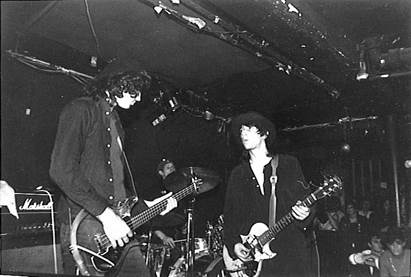
PSF: So it was a total coincidence? You didn't set this up, it just kind of happened?
SR: Well, we did set it up to the point that Johnny, a few months earlier was playing a gig in Pawtucket which is about an hour south of Boston, and coincidentally he was playing at a club called "Simons." So me and Joe and the rest of The Daughters got in the band van and went to the show that night to see Johnny, I had seen him before but I had never met him and, I am not a great shows' person, I mean, I am okay on stage but I have never been one of these people who could pick up a phone and demand a big contract, It was just the opportunity or something and I had a cassette of The Daughters doing a couple of Doll songs or Heartbreaker's songs at practice and before the show Johnny was wandering around and we went up to him, me and Joe, and just introduced ourselves like a couple of mushy fans. Johnny just kind of said "Hello," and I am sure you have heard a lot about Johnny and he could be very volatile, very... well, to be honest... he could be a real asshole and we were just lucky that we caught him in part of a good night when he was in a good mood. And I think that in retrospect, we were just oozing sincerity, we just so obviously loved him. We weren't hitting around for gigs or anything. We just wanted to meet him and I gave him a tape, like, "Johnny, here is a tape of our band doing some of your songs," and he put it in his pocket and I am sure, probably soon lost it, but that was the first time we met and it wasn't a lengthy meeting. We just spoke to him for a few minutes, got to meet him, and then we watched the show. At the time he was being partially managed by a guy named Bill Walch and he lived in Rhode Island. So through him, a few months later, we got booked to open for Johnny.
PSF: You had been in touch with his management?
SR: Oh yeah. We were bugging him. We had booked with him unrelated events, he didn't just manage Johnny. He was kind of a freelance booking guy and so we both played a gig or two for him when he was working as just a booking agent for the night. He was an easy-going guy, a big guy, kind of a biker guy if I remember, and so he got us an opening gig for 100 bucks. The band could use our equipment, and that was the deal. And that is how we did that first gig.
PSF: And where was that?
SR: That was in a place just called Harpo's in Newport, Rhode Island.
PSF: Okay, and so after you played at that gig with him, I imagine they continued on with their tour. How do you then hook up again?
SR: Well, he wasn't touring per se. He was working out of New York, you know.
PSF: Okay, this was just a gig that he drove to.
SR: Exactly. So consequently, that first gig with him was a beautiful... like I said July 4th was a beautiful day, this place Harpo's was on the ground floor. It is just what you call fortuitous, so it was a nice day and we had the second floor to ourselves, and one of these places might have been a hotel or something, so there were these balconies and I remember we were there way early and Johnny was too, which wasn't always the case, a lot of times he was way late. He remembered meeting us a few months before and once again, he was in a good mood. I didn't realize, I would find out later, how fortunate we were. Of course I had heard stories and heard rumors...
PSF: So he wasn't all strung out when you were meeting him. He didn't seem like he was all high...
SR: He was strung out, I mean, he was a day-to-day drug addict. But I didn't quite get that maybe the first couple of times I was in his presence. He was talking about getting high and stuff but I didn't see a guy who was on the nod or anything like that.
PSF: That is kind of what I meant.
SR: Yeah. But I would see that later on, yeah. So that first gig we were just lucky, once again Jerry was part of the band which I was the drummer at that time and so as brothers we were to play with Johnny, like, having Jerry be in the band was like the icing on the cake, it was just... you know and Jerry was a very reticent kind of person, didn't talk a lot, the ultimate kind of like Mr. Cool. But we were just lucky it was a beautiful day and they were happy to hang out and sit on this beautiful deck and hang around and drink and smoke cigarettes until it was time to play the show. And so it was just serendipity, it caught him at good times and so after that we became more... well, of course we were going to be happy with just one show. I mean, our appetite was whet, like we couldn't stop talking about it for days, you know.
PSF: Yeah, I can imagine.
SR: We were saying "Johnny said this" or "Jerry did that," just like little girls. So, we pestered Bill Walsh and we opened for him at other shows in Rhode Island and eventually shows in Boston. After a few gigs, Bill got tired of dealing with Johnny but by then, at that time we had established a rapport and relationship with Johnny and for the next couple of years, we were his de facto opening band of choice on the East Coast... Not every time but we ended up over the next year and half, a better part of two years, playing with him well over thirty times.
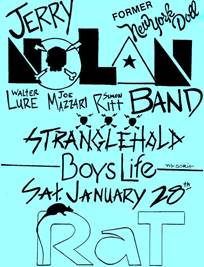
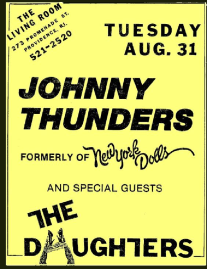
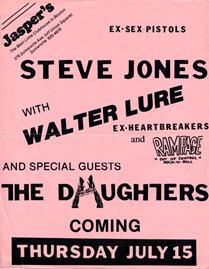
PSF: How did it happen that you became a bass player? I guess that when presented with the opportunity to play with your childhood hero, you became flexible in your musical ambition.
SR: Well, regardless of playing with Jonny, and I was a decent drummer by this point, drums were my natural instrument. But I noodled on guitar and I wrote some songs, and even when I was playing drums in The Daughters, I would sing a few songs while I was drumming, which I could do technically. But in the long run... no one wants to see the drummer be the lead singer.
PSF: I don't know... Karen Carpenter, Don Henley, El Duce... that's good company. What song did you sing on the EP?
SR: "German Girls."
PSF: You sang the "A" track!
SR: Yeah. So after we had played a few shows with Johnny, our bass player at the time his name was Bill Doherty, and he was a great guy but I think he just decided he didn't want to be in a full time rock band or be rock musician. It wasn't any big falling out, he didn't leave to join another band or anything, but he did kind of leave on short notice, very short notice and we had some gigs coming up opening for Johnny Thunders in Atlanta Georgia, which was a big deal for us. This would have been our first really big, far out of state gig. We had a friend of ours who could play drums, and kind of impulsively, I thought, "Well, you know I will play bass, you know I had already played a little guitar, how hard can it be? And this way I can sing the song standing up like a lead singer instead of from behind the drums." We had a close friend named Keith Chagnon and Keith was a drummer, and he had seen The Daughters a lot of times. He was at probably every Boston show. So he was able to learn our repertoire really quickly and then in just a couple of weeks, we were able to transform from a band where I was the drummer or sing occasional lead to a band where I was the bass player singing about half the songs. Joe would sing the other half and in that respect, it might not have been musically the soundest decision. But at the time, we didn't miss a gig, we just kept going.
To us, these Johnny Thunders gigs were... to us that was success. Every time we had another one of those gigs it was just another feather in our bonnet; we were just so excited. Even when the gigs were less than stellar or times when working with Johnny Thunders really wasn't very pleasant and was nothing but a giant pain in the ass... but it was always an adventure, it was always interesting, it was always better than not playing with him at all. Much better, and there is not a second of my time I spent with Johnny and, not just Johnny but also Walter and Jerry...not a second that I regret. As far as moving to bass, I was a better drummer than I was a bass player and so sometimes I regret changing. Listening to the recordings we made...
PSF: I've read that there exists an unreleased LP. Is that something that was recorded at that time and is there a reason that it is unreleased because you are not comfortable with how the band sounded at that time?
SR: It's not really an LP per se- just tons of pieces of recordings we did at various times. We did a lot of recordings,
PSF: Okay, well, a potential LP then? Sounds like you have an LP's worth of material.
SR: Yeah. And we did it over the period, some with the original lineup and then some later after we had transformed and, we had a lot of energy back then in those days and we really thought we were bad. We weren't. We were like, little kids trying to ape our heroes. I learnt subsequently, I think most creative people do. You have got to be yourself, as much as you like Johnny Thunders, there is only one Johnny Thunders and he is the best at being Johnny Thunders. But, we were young and we were full of piss and vinegar.